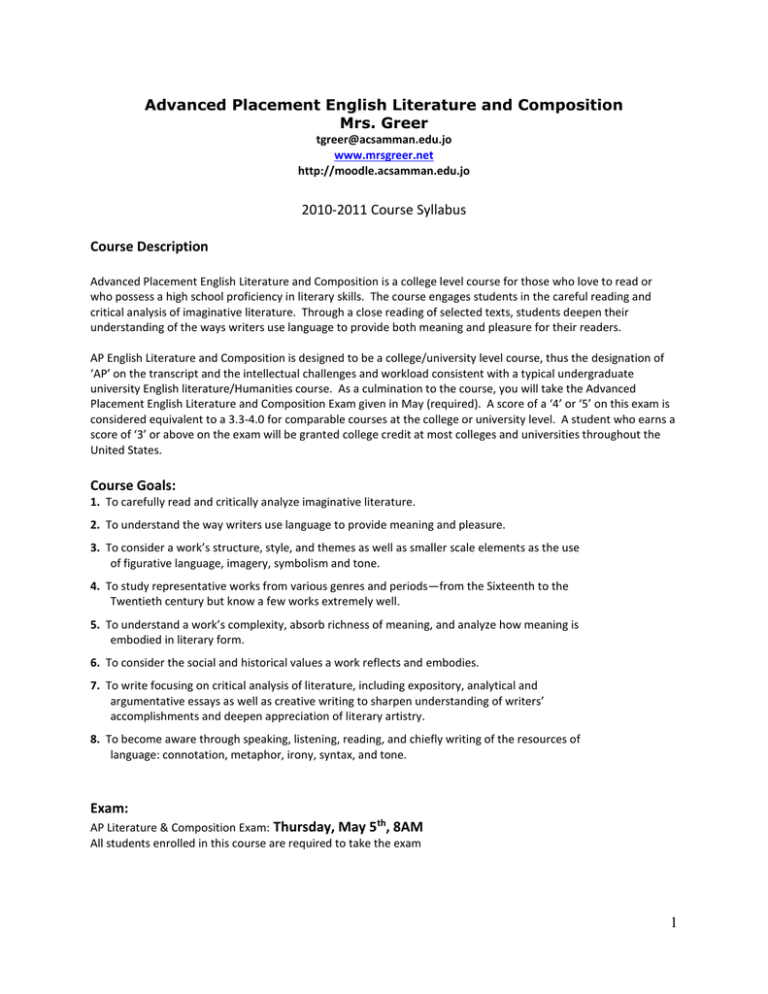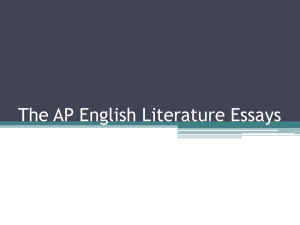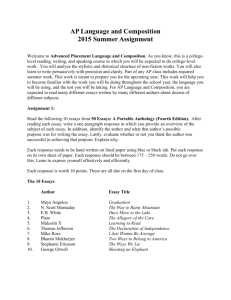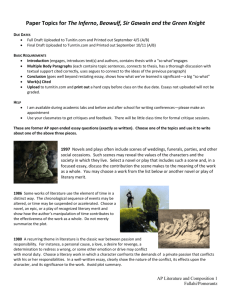Classroom Expectations & Policies
advertisement

Advanced Placement English Literature and Composition Mrs. Greer tgreer@acsamman.edu.jo www.mrsgreer.net http://moodle.acsamman.edu.jo 2010-2011 Course Syllabus Course Description Advanced Placement English Literature and Composition is a college level course for those who love to read or who possess a high school proficiency in literary skills. The course engages students in the careful reading and critical analysis of imaginative literature. Through a close reading of selected texts, students deepen their understanding of the ways writers use language to provide both meaning and pleasure for their readers. AP English Literature and Composition is designed to be a college/university level course, thus the designation of ‘AP’ on the transcript and the intellectual challenges and workload consistent with a typical undergraduate university English literature/Humanities course. As a culmination to the course, you will take the Advanced Placement English Literature and Composition Exam given in May (required). A score of a ‘4’ or ‘5’ on this exam is considered equivalent to a 3.3-4.0 for comparable courses at the college or university level. A student who earns a score of ‘3’ or above on the exam will be granted college credit at most colleges and universities throughout the United States. Course Goals: 1. To carefully read and critically analyze imaginative literature. 2. To understand the way writers use language to provide meaning and pleasure. 3. To consider a work’s structure, style, and themes as well as smaller scale elements as the use of figurative language, imagery, symbolism and tone. 4. To study representative works from various genres and periods—from the Sixteenth to the Twentieth century but know a few works extremely well. 5. To understand a work’s complexity, absorb richness of meaning, and analyze how meaning is embodied in literary form. 6. To consider the social and historical values a work reflects and embodies. 7. To write focusing on critical analysis of literature, including expository, analytical and argumentative essays as well as creative writing to sharpen understanding of writers’ accomplishments and deepen appreciation of literary artistry. 8. To become aware through speaking, listening, reading, and chiefly writing of the resources of language: connotation, metaphor, irony, syntax, and tone. Exam: AP Literature & Composition Exam: Thursday, May 5th, 8AM All students enrolled in this course are required to take the exam 1 Required Texts and Materials In the AP course, the student should consider obtaining a personal copy of the various novels, plays, poems and short fiction used in the course. You may purchase copies of the reading selections from your local new or used book store, or from an online book source. However, the majority of the reading selections can be issued through the high school English Department and accessed online in our class website: www.mrsgreer.net. If you choose to write in the school issued text, you will pay for the cost of the book. Required Texts Oedipus the King, Sophocles The Tragedy of Hamlet Prince of Denmark, Shakespeare Death of a Salesman, Miller Wuthering Heights, Brontë The Importance of Being Earnest, Wilde A Midsummer Night’s Dream, Shakespeare Heart of Darkness, Conrad Slaughterhouse-Five, Vonnegut Fences, Wilson Short Fiction and Essays—as selected Poetry—as selected Additional Student Texts Perrine’s Sound and Sense: An Introduction to Poetry (11 ed.)-by Arp & Johnson Dictionary of Literary Terms & Literary Theory (Penguin Books) How to Read Literature Like a Professor, Foster (Harper) Writing With Style, Trimble (Prentice Hall) Materials 1. 2. 3. 4. Two or Three-ringed binder w/ dividers (at least 1 ½ in) College-ruled spiral note book. Must be A4 size and have perforated edges. Blue and Black pens Removable drive Writing Expectations Writing is an integral part of the AP English and Literature and composition course and exam. Writing assignments focus on the critical analysis of literature and include expository, analytical, and argumentative essays. Composition assignments will include: statements, developed paragraphs and comprehensive journaling, timed writes (essay tests), and formal essays. No matter the kind of writing assigned, your best composition skills should be practiced. 2 Grammar & Usage As upper classmen in an AP English course, you should have a good command of standard written English. Occasionally you may need some help with this beyond what we review in class using John Trimble’s Writing With Style. There are many good on-line guides to grammar. The link below is one such. Please consult this guide, a writing handbook such as Patterns for College Writing (Bedford/St. Martin), or ask for further clarification in the senior writing class. http://grammar.ccc.comnet.edu/grammar/index.htm Journaling (Reader’s Response Notebook) Your literary journal is not a diary; rather, it is an important means by which you will develop your writing and a better understanding of the texts we read in class. It is the place where you will incorporate the ideas we discuss in class, your own ideas about literature and the specific texts we study, and your personal relationship with those texts. It will be invaluable to you when you prepare for examinations, papers, informal class discussions, and seminars. You should use your journal for AP English only. You must have your journal in class every day. They will be collected, assessed, and evaluated. Discussion Board Many times you will be asked for your opinion or idea about an aspect of a work of literature. You will post these to a discussion board on Moodle. Please use complete sentences with clear support for your ideas and when you reply to others. The grading rubric for the discussion board is on our class website. On-Demand Paragraphs & Smaller Essays Several times you will be asked to write on-demand in class and they will be informally and formally assessed. The expectation is that you spend 5-7 minutes outlining your work, then constructing a complete, longer piece of work--a paragraph or essay. This written work should still reflect your best composition skills and meet the evaluation criteria outlined: Idea Development Organization Fluency & Style Tone Word Choice Conventions -Well-focused and persuasive essay which addresses the prompt directly and in a convincing manner -Shows exceptional insight and language facility -Excellent organization: Relevant, accurate details—quotes, citations, and explication -Clearly understands the essential components of an effective essay -Demonstrates exceptional insight and language facility -Avoids: first-person pronouns, passive constructions, antecedent errors -sophisticated, complex, specific, consistent -Word choice and literary devices/and or techniques are not merely listed, but the effect of those devices and/or techniques is addressed in the context of the passage, poem, or novel as a whole -Mastery of mechanics 3 Formal Essays All assignments for formal papers will include guidelines, a model, and a specific assessment/grading rubric based on the AP Writing Expectations. Please consult each before submitting your work. -You will be expected to submit an outline for each paper PRIOR to drafting -You will rewrite larger papers and literary analysis after you receive feedback -All final drafts must be submitted to www.turnitin.com. Timed Writes Timed writes, or Essay Tests, are modeled after the AP English Literature and Composition exam questions 1, 2, and 3 in the free response section of the test. All your work will be handwritten in class during the prescribed 40 minute time limit. You must write in blue or black ink, and your handwriting must be legible if the essay is to be scored. The timed writes will be assessed/scored based on the prompt and the AP holistic scoring guide/rubric—this includes your literary knowledge as well as your skill as a writer (including grammar). Portfolio Throughout the course of AP English and Composition, we will keep a writing portfolio of all your essays, formal essays, timed writes, and practice tests/exams. This “portfolio” is a standards-based compilation to help you measure your writing growth as expected at the AP level. Students will have a chance to rewrite certain assignments and resubmit then for additional feedback. To earn back points, the student will also have to meet with the teacher to discuss the revision process and new outcome. Written reflection is a component of your portfolio and will be evaluated. Below is a table outlining the AP writing standards as they are aligned with the 6+1 Traits of Good Writing. The Portfolio Reflection is included. Course Grading Assignments in AP English and Composition fall into the following weighted categories: 15% Participation, Discussion (online, in class) & Group Work 20% Homework & Reader’s Response 30% Timed Writes, Presentations, & Novel Seminar 35% Quizzes, Tests & Essays -Each semester is weighted 40% -Each semester exam (includes mock exam) is weighted 20% *The score on your AP English and Composition Exam does not impact your course grade 4 Homework Attendance and completed homework assignments are important for success in AP Literature & Composition. Homework is designed to reinforce material covered in class or to prepare for the next day’s work. Most college professors do not accept late work, so our late work policy is rigid. Under extenuating circumstances you may arrange for an extension at the teacher’s discretion. See ‘Classroom Policies’ for further clarification. Discussion Class participation is an important part of any course. You are expected to actively participate in all class discussions, online discussions, seminars, and performances. Additionally, absences and tardies will be reflected in the participation grade as well as other off-task behaviors (talking, working on other class work, writing notes, playing with cell phones/iPods, not participating etc.) Quizzes & Unit Tests Quizzes and tests will be given throughout the year to ensure you are doing close readings of the texts. Quizzes will be announced and unannounced. Unit tests will contain multiple choice questions and essays formatted like the AP exam. Unannounced quizzes cannot be made up if you are absent. Journal, On-demand Writes, & Timed Writes See description listed under ‘Writing Expectations’. Grammar instruction and reflection are considered as part of your score in these areas. Presentations & Seminars Presentations and seminars are conducted throughout the course; you will sign up for a variety of presentations as well as a novel seminar. Once you are signed up, you may NOT remove or change your selection. Please review the calendar of dates and consult your activities calendar prior to signing up. Presentations and seminars are an integral way of synthesizing your response to literature, demonstrating your analysis of a work, and conveying your creative, insightful thoughts. This is the ultimate level of performance in our class; therefore, it requires forethought, detailed planning, taking initiative, and development. All presentations are to be well-prepared according to teacher guidelines and scoring rubrics, include audio/visual sources, as well as incorporate technology and creativity. The presentations and seminars will become an integral component of your creative and informal writings. These writing responses can then further be used for your argumentative essays. Essay & Formal Essays See ‘Writing Guidelines’ for further description. 5 Exams The fall semester exam is modeled closely after the AP English Literature and Composition exam. It is comprised of multiple choice questions and one to two essay questions reflecting the material covered. It will be taken in the gym on the designated exam date. The exam is 8090 minutes in length. The exam will be scored according to the AP scoring guide and will count as 20% of your semester average. The spring semester exam is a mock exam. This means it is a simulated AP English Literature and Composition Exam. The exam will consist of multiple choice questions—limited to 60 minutes—and three free response questions pertaining to 1) prose 2) poetry 3) novel selections. Performance on the essay section of the exam is limited to 120 minutes. The exam will be scored according to the AP scoring guide and will count as 20% of your second semester average. The AP Literature and Composition exam is Thursday, May 5th at 8:00 AM. We will review a week to two weeks before the AP exam. We will use the mock exam, previous test/quizzes, and your writing portfolio to prepare. 6 Classroom Expectations & Policies Classroom Expectations 1. 2. 3. 4. 5. Be on time with all materials Participate with the intention of learning Follow all directions with academic honesty/integrity Positively contribute to our class community Be respectful Rewards For Your Success! Praise, Personal Recognition, Classroom Leadership Roles, Positive Notes Home, Certificates, Class or School Nominated Awards… Consequences: 1st time: Student redirected or cautioned by the teacher 2nd time: Student-teacher conference is held. Parent(s) may be contacted about the situation if needed. 3rd time: Student will receive a detention. 4th time: Parent will be contacted about the situation &/or a parent meeting will be held. Severe clause: Further insubordination will result in an office referral and/or a parent-teacher-student meeting with the Principal Classroom Policies A. Attendance Absences & Tardy 1. Attendance will be taken daily by the teacher and office. Excused absences require proper documentation and acceptance by the HS office. 2. Three or more unexcused absences and/or tardies will result in detention, homework penalties, and possibly no credit for this course. (Please refer to the pages of your 2010-2011 ACS Student Handbook regarding attendance) B. Assignments Late Work & Unexcused absences 1. Work is due at the beginning of class, otherwise it is considered late. Work is also considered late if you have it but can’t find it, you have it on your flash drive, you had printer issues, “you swear you did it, but”…etc. 2. Late work must be turned in by the beginning of the next consecutive calendar day for partial credit. It will receive a 10% reduction for “same day late”, 25% reduction for one calendar day and 50% for 2 or more days late. Turn all late work in directly to the teacher. 3. Unexcused absences will result in a 0% on any work due that day. Excused Absences 1. Students who are officially excused by the office for absence may turn in the assignment or complete the missed assignment the next time class is scheduled to meet. You are responsible for checking our 7 class website for any missed work, handouts, notes etc. www.mrsgreer.net or on MOODLE. Please turn in all absent work directly to the teacher. If you have questions regarding an assignment, please email the teacher: tgreer@acsamman.edu.jo 2. EMAC ACTIVITIES: If you miss an assignment that was assigned while away on an EMAC event, you shall have one week from the day you are supposed to return to school to make up the missed assignment(s). Assignments given PRIOR to travel are due on previously assigned due dates or teacher arranged due dates. (Please refer to page 2010-2011 ACS Student Handbook for make-up work) C. Academic Honesty All students are expected to follow the ACS Student Code of Ethics. All written work will be submitted to turnitin.com for plagiarism prevention. Please refer to your 2010-2011 ACS Student Handbook for guidelines and/or consequences. D. Acceptable Use Policy All students are required to read and follow the school’s technology policy. Use my email: tgreer@acsamman.edu.jo , our class website: www.mrsgreer.net , or http://moodle.acsamman.edu.jo to keep on top of your work! Remember that this is a college level course and the expectations for communication are now much more your responsibility! 8 Course of Study Unit 1-Short Fiction Essential Questions 1. How does a writer of poetry and prose craft a work of literary merit? What makes their work noteworthy? 2. What is style and form? How does this differ from plot? 3. How are the various writers we read a “technician” of their form? Consider grammar/conventions as well. 4. How does point of view shape/influence the rest of the story elements? How does POV impact time, action, and relationships? 5. Does the knowledge that a particular short fiction piece was written in the past or present or by a man, woman, or particular racial/ethnic group influence your reaction to the story? To its validity as a piece of art? Required Readings: Writing Focus “A & P” (John Updike) How the short fiction pieces open—connect to the chapters “Launching” and “Openers” in Trimble’s Writing With Style “The Yellow Wallpaper” (C. P. Gillman) “Everyday Use” (By Alice Walker) “Greasy Lake” (T. Coraghessan) “Barn Burning” (William Faulkner) “Harrison Bergeron” (Kurt Vonnegut) “Where Are You Going, Where Have you Been?” (Joyce C. Oates) Unit 2-Satire & Comedy Essential Questions: 1. Why is satire difficult for students to identify? 2. Can satire accurately be categorized as realism? 3. ‘Whatever is, is right?’ (Pope) Is satire and/or comedy the ultimate truth? 4. Does the diction/syntax change if irony is constructed for humor or serious purposes? 5. Shakespeare and Wilde are masters of syntax in developing their characters. What implications does this have on their works as a whole? 6. What are the social implications Shakespeare is making by crafting A Midsummer Night’s Dream as a Green World Comedy? Is he commenting on society during his time? The institution of marriage? Are Shakespeare and Wilde, although from different time periods and writing styles making the same comments on marriage and society? Required Readings: Writing Focus The New Yorker-political cartoons and sources from www.cagle.com Extending writing from an explication to an analysis Quotes from: Dave Barry, Scott Witt, Jon Stewart, Mark Twain from Mambo Mouth: Pepe (John Leguizamo) “Rodeo” (Jane Martin) “A Modest Proposal” (Jonathan Swift) -on line version Excerpts from The Importance of Being Earnest (Oscar Wilde) A Midsummer Night’s Dream (William Shakespeare) 9 Unit 3-Classic & Modern Tragedy Essential Questions: 1. Consider the endings of Oedipus the King, Hamlet, and Death of a Salesman. Are the characters irredeemable? 2. Is the tragic mode archaic? Is it archetypal to the point that it is a paradox to have a ‘modern’ tragedy? 3. To what extent is the male figure foolish, heroic, or fated in these plays? Is it more tragic that the father figure suffers or is the real tragedy what the women/mothers must endure? 3. To what extent does personal dignity drive us and blind us? Has this desire changed over time in society? 4. Do we have a strong desire for order because we fear the unknown, or do we desire order for a higher moral purpose? 5. Are the sacrifices one endures/suffers truly a measure of man and how he lived? Required Readings: Writing Focus Oedipus the King (Sophocles) Critical Analysis The Tragedy of Hamlet, Prince of Denmark (William Shakespeare) Death of a Salesman (Arthur Miller) Unit 4-Women in Literature Essential Questions: 1. How does gender impact the political, religious, ethical, and social influences a character has on the plot of a novel/play? 2. A woman in the family system is essential, yet is often the source of triangulation, scapegoating, and transgenerational repetition. To what extent do Catherine and Nora’s characters change this perception of women and women in literature? 3. Ghosts are both literal and figurative in Wuthering Heights and A Doll’s House. To what extent does the psychological, economic, and social ‘ghosts’ for these characters add to the realism of the characters/novel? 4. In the time periods of Brontë and Ibsen, acceptable literary form followed established patterns. How do Brontë and Ibsen break free of these conventions to create a novel for all times or a truly modern play (not well-made). Required Readings: Writing Focus Wuthering Heights (Emily Brontë) Introduction to Compare & Contrast Introduction to Wuthering Heights-by Pauline Nestor Editor’s Preface to the New [1850] Edition of Wuthering Heights A Doll's House (Henrik Ibsen) Unit 5-Classic Poetry Essential Questions: 1. What is the poem’s central purpose? How does poetic form impact a poem’s purpose (author’s purpose)? 2. What does a poem gain by shifts in meaning? Syntax? Tone? 3. How does meter impact the overall tone of the poem? Required Readings: Writing Focus Epigrams-Ben Jonson Sonnet Study-Sidney, Shakespeare, Spencer Villanelle-Dylan Thomas Sestina-E. Bishop Ode-Keats Explication & Analysis 10 Unit 6-Classic & Modern Novels Essential Questions: 1. What are the implications of the novel's title phrase, Heart of Darkness/The Poisonwood Bible, particularly in connection with the main characters' lives and the novel's main themes? How important are the circumstances in which the phrase comes into being? 2. What were the causes, effects, and moral implications of European colonialism in the late nineteenth century? 3. How does Conrad’s use of mystery, uncertainty, and ambiguity reinforce the themes of the story? 4. Is Conrad’s use of narrative distance and the multiple levels of narrative employed effective? What impact does it have on the characters? and the audience? 5. How does Kingsolver use voice to distinguish her characters? What does each sister reveal about herself and the other three, their relationships, their mother and father, and their lives in Africa? 6. What social themes does Conrad assert in Heart of Darkness? To what extent does point of view impact the author’s message/themes? 7. Is Conrad’s use of imagery effective in reinforcing the themes of the book? 8. The sisters refer repeatedly to balance (and, by implication, imbalance). What kinds of balance--including historical, political, and social—emerge as important? Required Readings: Writing Focus Heart of Darkness By Joseph Conrad Compare & Contrast Essay Poisonwood Bible By Barbara Kingsolver Imperialism and the Congo-pgs. 193, 194, 197, 205, 207 (Norton) Unit 7-Metaphysical to Modern Poetry Essential Questions: 1. What characterizes a literary period? 2. How are our selected poets conscious of the habits of their contemporary world—and of each other as writers (intertextuality) 3. How is poetry a multidimensional language? 4. What is the poem’s central purpose? How does poetic form impact a poem’s purpose (author’s purpose)? 5. What does a poem gain by shifts in meaning? Syntax? Tone? Required Readings: METAPHYSICAL -John Donne ROMANTICS -Blake -Wordsworth -Coleridge -Byron -Shelley -Keats AMERICAN POETS -Robert Frost* -Walt Whitman -TS Eliot -Henry David Thoreau -Langston Hughes -Toni Morrison -Gwendolyn Brooks -Sylvia Plath -Emily Dickinson* (*Perrine’s 770,955) Writing Focus Compare & Contrast Essay 11 Unit 8-Modern to Post Modern Novels Essential Questions: 1. In what ways is The Great Gatsby and Slaughterhouse Five autobiographical novels? Does the character of Nick or the character of Gatsby seem most like Fitzgerald? What other people or events mirror Fitzgerald’s life? And Billy Pilgrim and Kurt Vonnegut? 2. One of Fitzgerald’s strengths comes from his imagistic style. Vonnegut uses “clumps of images” or scenes as its main structure. How are these authors’ styles reflective of literature in/of their respective times? (modernism and post-modernism) 3. Compare and contrast the literary elements of The Great Gatsby and Slaughterhouse Five according to Freytag’s Pyramid. To what extent do the authors either follow or violate this principle and the impact the plot structure has on the overall meaning of their respective novel? 4. Fitzgerald and Vonnegut clearly draw parallels between geography, social values, and characters. How does this compare to the short fiction pieces we read by Faulkner and O’Connor in Unit 1? 5. The technique of a first-person narrator presents certain problems of objectivity and reliability for the reader. To what extent is Nick a reliable narrator, and is his evaluation of Gatsby ultimately just? To what extent is Billy Pilgrim reliable? Does Vonnegut’s assertion into the narration create intimacy with the audience or does it intrude? Required Readings: Writing Focus The Great Gatsby-F. Scott Fitzgerald Slaughterhouse Five-Kurt Vonnegut Explication, Critical Analysis, or Compare/Contrast Essay 12




